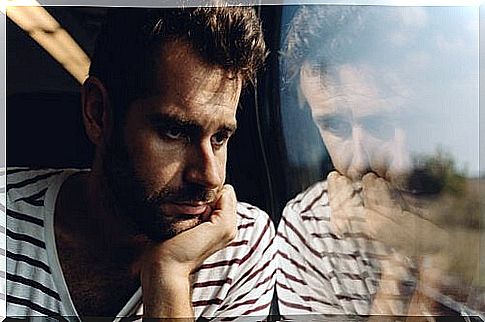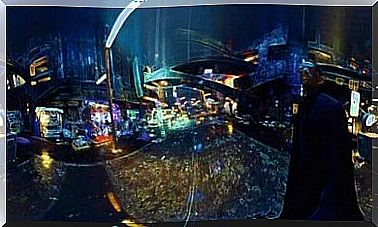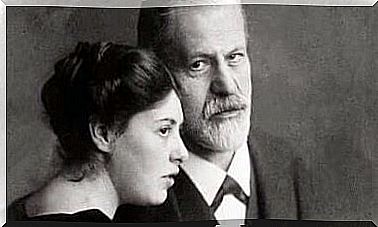Existential Emptiness, Feeling That Life Has No Meaning

Life has no meaning, this is the main belief of those who experience the excruciating sensation of existential emptiness, combined with the weight of injustice and a sort of disconnection from what surrounds them.
They are generally thoughtful people, who investigate relevant topics, such as death or lack of freedom, and who cannot separate themselves from the deep existential void that sucks them up more and more. Emptiness to which society contributes with its messages marked by the values of individuality and immediate satisfaction.
There are also people who browse in pleasures with the sole purpose of anesthetizing suffering. But even this is not enough to fill the void.
For both, there are no reasons for life. Nothing fills them, nothing satisfies them and they end up being trapped in a psychological state of suffering. In most cases, this situation leads to deep depression or self-destructive behavior.
Existential emptiness: the feeling that life has no meaning
The existential void is an endless spiral. Recognize yourself as someone who sees the world from a different perspective because of constant inconsistencies or because he got carried away in the pursuit of pleasure to avoid suffering. A very widespread phenomenon today.

The depth of the abyss
Developing one’s search for meaning in life can be frustrated by not achieving goals. When the clash between expectations and reality is so strong that only disappointment remains or when crisis situations threaten the sense of security and certainty, without even having the adequate tools to deal with them.
All this leads to a deep state of existential frustration that empties the person and can lead them into an abyss of pain. As if inside it hosted a desert, in which unreason dominates existence and where the ability to relate and feel others is lost.
The psychologist Benjamin Wolan called this state with the name of existential neurosis and defined it as “the inability to find meaning in life; the feeling of not having a reason to live, to fight, to have hope … of being unable to find a goal or direction in life, the feeling that even if people put in their work hard, they really don’t have any aspiration “.
Some authors, such as psychotherapist Tony Anatrella, point to the constant quest to satisfy the ego as the cause of the loss of meaning, since it is selfish actions that impede the capacity for personal transcendence.
The existential void and the loss of meaning
In relation to the above, other authors affirm that the loss of meaning is associated with the disappearance of the other, the supremacy of individualistic values and the attainment of pleasure as a – wrong – mechanism for being happy. In this way, the person clings to their individual desires, weakening the sense of social references, such as coexistence, solidarity or mutual respect.
When reality becomes confused and the means to achieve happiness become ends in themselves, there is a risk of falling into the void. Short-term pleasure emotions, such as fun or joy, bring pleasure, but not self-fulfillment, and like any pleasure, they carry with them the danger of creating bondage or addiction.
In a sense, man needs to do something with his life, which is not only something good, but also something created by him. The meaning of life is therefore linked to the destiny that man desires and needs ; because through this desire, he tries to bring freedom to his evolution, since when he lives fully, when freedom goes beyond the limits of immanence, he understands that the meaning of his life is not reduced only to something material and finite, but goes beyond .
The problem arises when this does not happen as expected, when circumstances do not meet the expectations of his life plan and nonsense leads to the abyss of existential emptiness.

The noetic dimension of man
According to the Swiss psychiatrist Viktor Frankl, man is characterized by three main dimensions:
- Somatic. Including the physical and biological sphere.
- Psychic. Referred to the psychodynamic reality, that is the psychological and emotional universe.
- Noetics. The spiritual dimension. It understands the phenomenological purposes of the soul. This dimension transcends the other two. Moreover, thanks to it, the human being can integrate the harmful experiences of existence and develop a healthy life on a psychological level.
When the person experiences a deep state of boredom, aversion and gets lost in the labyrinth of his existence, conflicts arise in his spiritual dimension. He is unable to integrate his wounds and may not even be able to locate them. Nor to find a reason for its existence, in such a way as to drown in suffering, experiencing a lack of meaning, coherence and purpose, that is: the existential void.
Frankl states that this emptiness is the root of many psychic disorders. That is, the rupture of the noetic or spiritual dimension, that feeling for which existence has no meaning, and which is expressed in the psychological dimension through three groups of main symptoms:
- Depressive symptoms
- Aggressive symptoms, with or without impulse control.
- Addictions.
It is as if people trapped in the existential void cover their eyes and feelings with an unconscious veil, which prevents them from finding the meaning of life and which leads to chronic dissatisfaction and despair. What needs to be done to find this meaning?
The search for meaning
According to the Swiss psychologist Carl Gustav Jung, man needs to find meaning to keep making his way around the world. Without this meaning, he gets lost in nothingness, in no man’s land, wandering in the labyrinth of existence.
Frankl points out that the path to meaning is mediated by values and that social awareness is the tool that reveals it. Now, even if values are born in personal intimacy, they end up culminating in universal values, which coincide with cultural, religious or philosophical systems.
The relationship with the other is important in order not to lose the meaning of life. As well as the maintenance of emotional ties, as long as you do not place your responsibility to be happy in them. In a sense, life with meaning is a life rooted in the social.
The French sociologist and philosopher Durkheim reflects very well on the problem of social uprooting and its consequences: “[when the individual] becomes individualized beyond a certain point, if he separates himself too radically from other beings, men or things, he finds himself isolated from same sources through which it should naturally feed itself, with nothing left to draw from. By creating a vacuum around him, he has created a void within himself and there is nothing left to think about but his own unhappiness. He has no other object of meditation than the nothingness in it and the sadness that is the consequence “

The existential void and the meaning of life
It is not a question of seeking neither guilty nor saviors, but rather to adopt a reflective and responsible attitude that allows us to investigate internally, find a purpose and get out of the existential void. Because it is true that there is no more complex doubt for us about the meaning of life.
It is fair to say that there are many ways to define the meaning of life, as many as there are people. And even each of us can change our purpose in life during our existence. What matters, as Viktor Frankl said, is not the meaning of life at a general level, but the meaning we attribute to it at a given moment.
Furthermore, Frankl argues that we should not investigate the meaning of life, but understand that it is ourselves that we are concerned about. That is, we could respond to life by responding to our own life. This means that responsibility is the very essence of our existence.
Because although we have invested time, energy, effort and heart, sometimes life is unfair. And even if in these moments it is totally understandable to break down, we have two options: accept that we cannot change what happened, that there is nothing we can do and we are only victims of circumstances or, accept that we actually cannot change what happened, but we can change our attitude towards it instead.
Conclusions
We are responsible for our actions, our emotions, our thoughts and our decisions. For this reason, we have the possibility to decide why and to whom or what we hold ourselves responsible.
The meaning of life is always changing. Every day and every moment we have the opportunity to make the decisions that will determine whether we will be subject to circumstances or whether we will act with dignity, listening to our true self with responsibility and free from the traps of pleasure and immediate satisfaction.









